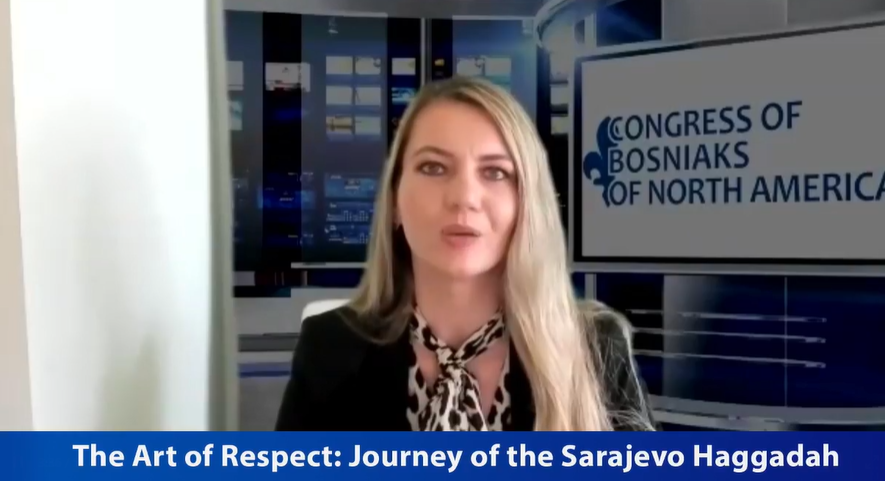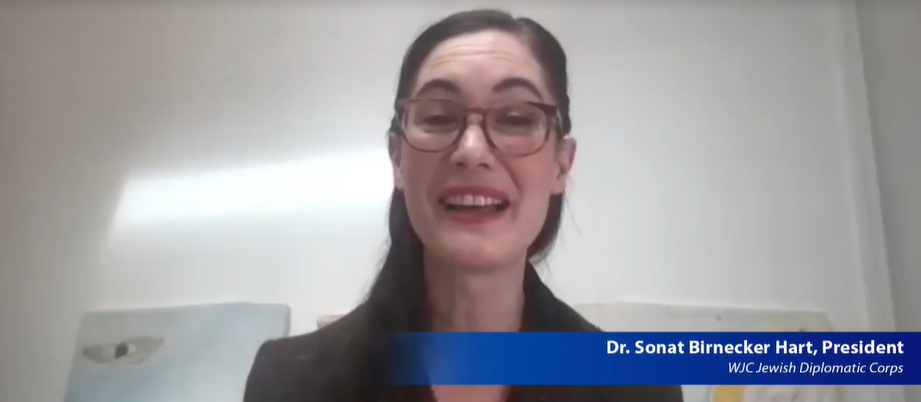WJC explores journey of the Sarajevo Haggadah in virtual event
23 Mar 2021The World Jewish Congress and the Congress of Bosniaks North America held an event on Sunday to delve into the history and significance of the Sarajevo Haggadah.
The Sarajevo Haggadah represents an exquisite example of medieval Jewish decorative art, written on parchment with superb illuminations. According to David Stern, a professor of Jewish and Hebrew literature at Harvard University, the Sarajevo Haggadah is “probably the most famous medieval illustrated Hebrew manuscript, period.”
The event began with a moderated discussion led by Congress of Bosniaks of North America Director of Community Relations Vehida Spiodic, featuring Mr. Eldin Kajevic, President of the Congress of Bosniaks of North America, Hon. Elvir Resic, Consul General, Consulate General of Bosnia and Herzegovina in Chicago, H.E. Ambassador Dr. Sven Alkalaj, Permanent Representative of Bosnia and Herzegovina to the United Nations, and WJC Jewish Diplomatic Corps President Dr. Sonat Birnecker Hart.
Mr. Kajevic opened the panel describing how the Sarajevo Haggadah represents not only "a story of common life and exile, but also a story of human compassion, devotion and a story that reveals the best of humanity and our ability to protect each other in the most difficult of times." Kajevic spoke about the heroism of curator Dervish Korkut and his wife, who risked their lives to save the Sarajevo Haggadah from Nazis, as well as their decision to save Mira Papo from the Nazis. He noted with admiration, that fifty years after saving Papo’s life, Papo’s son would rescue Dervish daughter when she became a refugee. Kajevic concluded saying that it is stories like these, which show the significance of the Sarajevo Haggadah, adding it "was saved by good peoples, but it also helped saved others as if it had remembered those who had saved and had its own way of saying thank you."

Consul General Resic, spoke about Bosnian Jewish musician Flori Jagoda, who passed away two months ago, calling her calling her "a great artist who connected traditions and culture, preserved her Jewish and Bosnian cultural identity, through song and a symbol of real multiculturalism.” Resic concluded his remarks saying that although she was an exceptional and extraordinary person "we all need more people like she was. We can all learn from her life."
Ambassador Alkalaj congratulated the World Jewish Congress and Congress of Bosniaks North America on “bringing the Sarajevo Haggadah closer to the wider population.” Alkalaj praised the Sarajevo Haggadah saying it represents the “story and history of Sephardic Jews in Europe above in Bosnia and Herzegovina," adding that it is a witness “to history, survival and many turbulent moments."
Dr. Birnecker Hart drew attention to the importance of passing down history and items like the Haggadah, saying, "in many ways to be a Jew means living with and through stories, which are believed not only to be a part of ancestral history, but one's own story." Hart proceeded to outline the Sarajevo Haggadah’s journey, concluding that the Sarajevo Haggadah "represents layers upon layers of Jewish stories, and stories of all the people the Jews had come in contact with as this manuscript wove its way through time and place."

Following the panel, the event transitioned to a discussion moderated by Hart with Igor Kožemjakin, Chazzan of Sarajevo Synagogue I, who called the Sarajevo Haggdah an “object of pride not just for Bosnian Jews but all of the citizens of Bosnia and Herzegovina." Kožemjakin said that the Sarajevo Haggdah “teaches us our existence because [it] survived all of the travels of the Jewish people not just World War II, the last war in Bosnia and Herzegovina, but also attempts to be stolen after World War II.
WJC’s Representative in the Balkans Ernest Herzog presented closing remarks, putting the journey of the Haggadah into perspective, noting that the destiny of the document reminds him of something Winston Churchill wrote: "When you're going through hell keep on going. Never, never, never give up." Herzog concluded, saying, “that against all odds the Sarajevo Haggadah and Jewish people are here today,” and calling on participants to "take upon the duty of the Haggadah; of never giving up hope to those who need it the most."